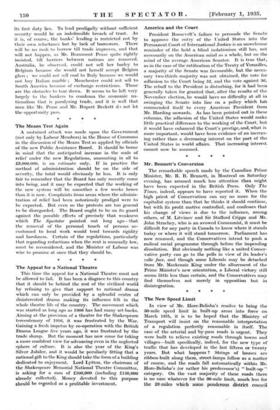America and the Court President Roosevelt's failure to persuade the
Senate to approve the entry of the United States into the Permanent Court of International Justice is an unwelcome reminder of the hold a blind isolationism still has, not necessarily on the American mind as a whole, but on the mind of the average American Senator. It is true that, as in the case of the ratification of the Treaty of Versailles, a majority of the Senate was favourable, but the neces, sary two-thirds majority was not obtained, the vote for adhesion to the Court being 52, and the vote against 36. The rebuff to the President is disturbing, for it had been generally taken for granted that, after the results of the November election, he would have no difficulty at all in swinging the Senate into line on a policy which lads commended itself to every American President from Mr. Harding onwards. As has been pointed out in these columns, the adhesion of the United States would make little practical difference to the working of the Court, hut it would have enhanced the Court's prestige, and, what is more important, would have been evidence of an increas- ing rather than a decreasing interest on the part of the United States in world affairs. That increasing interest cannot now be assumed.














































 Previous page
Previous page